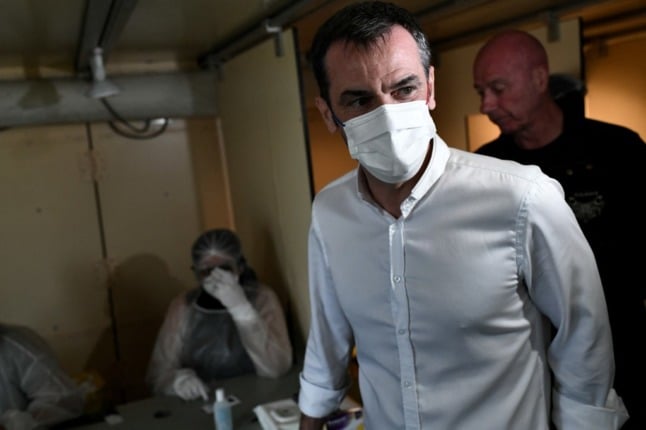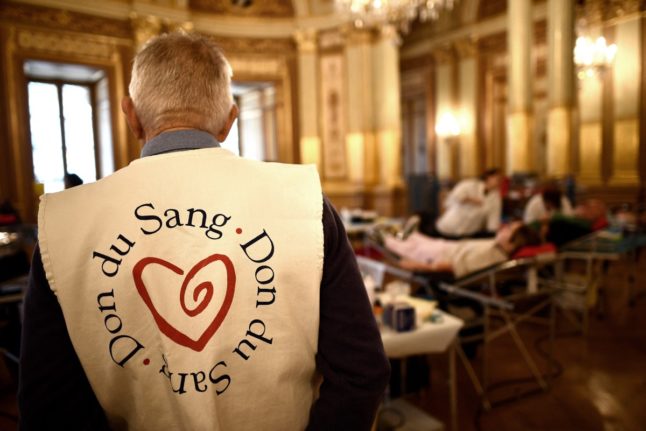Covid cases in France have been tumbling since the end of May, but Sunday marked the fifth day in a row where numbers did not fall, prompting the health minister to issue a stark warning – not only is a fourth wave of cases inevitable, it could be here by the end of July.
Véran wrote on Twitter: “For the last five days, the virus has not decreased, it is increasing, due to the delta variant which is very contagious.
“The English example shows that a wave is possible from the end of July. We can limit it and limit the impact with health measures, vaccinations and test and trace.”
Depuis 5j, le virus ne baisse plus, il réaugmente. A cause du variant delta qui est très contagieux. L'exemple anglais montre qu'une vague est possible dès la fin Juillet. Nous pouvons la limiter et en limiter l'impact sanitaire: gestes barrières, vaccin, tester/alerter/protéger
— Olivier Véran (@olivierveran) July 4, 2021
Cases in France now stand at an average of 2,500 a day – much lower than in the UK which is now over 10,000 per day, but growing.
Government spokesman Gabriel Attal said on Monday that the delta variant now accounts for 30 percent of all cases, up from 20 percent just a week ago.
Data from France shows that case numbers have plateaued or are rising in all age groups, although the rise is highest in the 20-29 year-old group. Cases are also rising in the 10-19 and 30-39 age groups.
Vaccination is now open to all over 12s, but younger age groups are less likely to be fully vaccinated since they became eligible later in the programme.
Among the 70 plus age groups, which have the highest percentage of fully vaccinated people, case numbers show no rise, as shown in the chart below by Le Parisien journalist Nicolas Berrod.
Le taux d'incidence augmente légèrement pour le sixième jour consécutif. Dans le détail par tranches d'âge, la hausse est surtout visible chez les 20-29 ans (suivent les 30-39 et les 10-19 ans). #Covid19
1/6 ⤵️ pic.twitter.com/wsrMPjEiCs
— Nicolas Berrod (@nicolasberrod) July 4, 2021
The delta variant, first identified in India, has been driving a big wave of cases in the UK, and experts had warned that the same would happen in France, although earlier predictions has focused on the end of August or September.
ANALYSIS: Will France’s fourth wave of Covid ruin the summer?
However over the weekend the Elysée said the focus had shifted from “saving la rentrée [the return to work in September] to saving the summer”.
Most health restrictions in France have already been lifted, although masks remain compulsory in all indoor public spaces and some outdoor spaces.
Local authorities have the power to impose tighter restrictions although so far only one area – Landes in south west France – has done so.
Data from the UK, which has a greater percentage of the population vaccinated than France, shows a rapid climb in case numbers, but a much slower climb in hospitalisations with Covid. The below chart compares the rates of cases and hospitalises in the UK (with different scales) through the second, third and fourth waves.
Ici, les deux graphiques superposés (avec deux échelles différentes, évidemment).
4/5 pic.twitter.com/ySCbQnrHkG— Nicolas Berrod (@nicolasberrod) July 4, 2021
However hospital numbers are rising, and experts have warned about other effects of Covid such as ‘long Covid’ that produces symptoms such as extreme fatigue and breathlessness in a minority of patients and can continue for many months.
There are also fears than uncontrolled spread of the virus can create conditions for other variants to develop, possibly ones that vaccines are less effective against.
As rates for first vaccination appointments begin to slow in France with the population heading off on holiday, the government has unveiled a package of measures that will make it easier to get the vaccine even if people are away from home.
READ ALSO Can I get vaccinated if I am on holiday in France?



 Please whitelist us to continue reading.
Please whitelist us to continue reading.
This really should not come as a shock to anyone. Come September it will be back to where it was at the beginning of the year. Governments are to quick lifting restrictions because of the start of the holiday season. Perhaps if they had kept the restrictions over July and August we wouldn’t be experiencing a repeat of what happened last year.
By autumn more than half of Germany will be fully vaccinated – so the situation will be very different.
What’s that got to do with the situation in France?